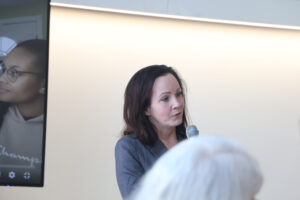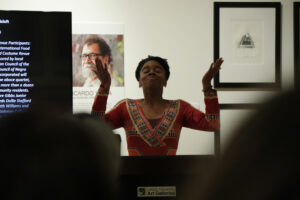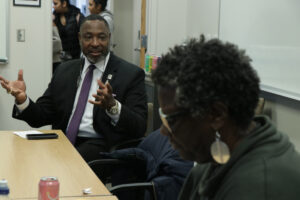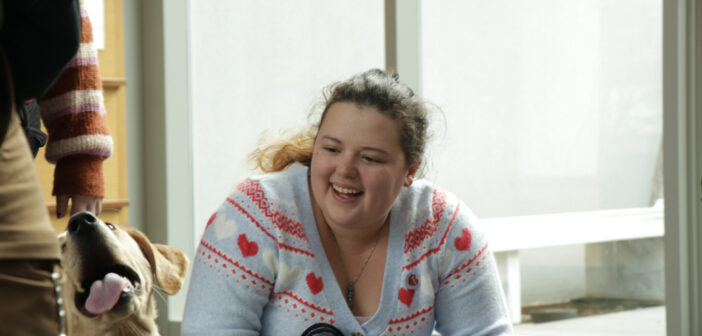For Marcon Institute director Holona Ochs, feminist author bell hooks is not just someone she looks up to, but someone she strives to embody in everything she does — at Lehigh and beyond.
Ochs said hooks’ ideologies about love and belonging inform ways to build community, something Ochs wanted to start dialogues about with the Lehigh and Bethlehem communities.
To do so, the Marcon Institute held the inaugural Radical Love Conference from March 4-8. Over the span of five days, community members attended free events inspired by bell hooks’ ideas.
Ochs said hooks defines love with several attributes: care, commitment, knowledge, responsibility, respect and trust. She said a genuine regard for others allows people to uplift their communities, which is what the institute sets out to do.

Holona Ochs, professor of political science and director of The Marcon Institute, opens the “Souls of Antiracists Breakfast” as part of the Radical Love Conference on March 5, 2023.(Nahjiah Miller/B&W Staff)
“Everything the Marcon Institute does, including the Radical Love Conference, is a creation of bell hooks that I am trying to revive and bring to Lehigh,” Ochs said.
The Marcon Institute for Anti-Racism was founded in 2021 on a $2.5 million gift from local businessman Charles Marcon. According to the institute’s website, it is working to “facilitate antiracist transformation in society through research, teaching, policy advocacy and cultural change that centers empathy and compassion.”
Since Och’s appointment in June 2022, she has overseen and facilitated workshops and events with this goal in mind.
“Ultimately what we are trying to do is create lifetime commitments to anti-racism,” Ochs said. “To leverage those commitments for policy and cultural change, and transform our society into an anti-racist society where everyone can thrive and we all feel like we belong.”
Each day of the Radical Love Conference was themed, which informed the conversations that took place. The themes included “Defeating Destructive Dogmas,” “The Art of Radical Love,” “Radical Love as Restorative Justice,” “Marcon Mountain Hawks Take Flight” and #embraceequity.

The Marcon Institute held a poetry reading on March 5, 2023, as part of the Radical Love Conference. It featured a guest speaker from Basement Poetry.(Nahjiah Miller/B&W Staff)
Some of the events and activities included artist exhibitions, poetry readings, therapy dog breakfasts and community discussions about restorative justice, a bell hooks documentary and anti-racism.
Samantha Haggert, ’24, attended the “(Women, Gender and Sexuality Studies) Writer’s Retreat” event on March 8. Haggert said she enjoyed engaging in a community where everyone was learning how to write through an intersectional lens. She said she found it impactful to learn how to write stories that don’t cut certain people out of the narrative.
“I think (The Marcon Institute is) really just trying to spread this foundation of love and spreading ideologies that impact marginalized communities to really amplify their voices,” Haggert said.
On March 7, the institute celebrated the inaugural cohort of Marcon Fellows with a dinner. Every year, students have the opportunity to apply and share their ideas for anti-racist transformation.
If selected, Ochs said the institute offers paid fellowships and associate fellowships for academic credit. Each paid fellow is granted up to $4,000 to fund their ideas.
This year, the program has 15 fellows and three associate fellows who are developing projects that span from art or technology to policy change. The application deadline for 2023 Mountain Hawk Fellows is March 24.
Marcon fellow Victoria Drzymala, ‘23, is studying political science and international relations. At the celebration dinner, Ochs described an internship Drzymala designed called Diverse Future Leaders in Government and Community Development with the goal of allowing students from underrepresented communities to gain experience in local politics.
Through a partnership between the university and Bethlehem City Hall, Drzymala said Lehigh students can learn what it takes to run a city over the course of one semester.
“This project was really personal because I don’t think I would have gotten involved in politics or civic engagement had I not had an internship, before I started college, with my local city hall,” she said.
Amber Brose, ‘24, who helped plan the conference, is studying political science and women, gender and sexuality studies. She has been researching the Lehigh Valley’s criminal legal system.
Brose said she has been conducting interviews to better understand how incarceration affects people.
“A lot of people who have been incarcerated have felt shame and anxiety around that designation,” Brose said. “I am trying to break some of that stigma and allow people to understand the ways in which the system has affected their individual lives.”
Ochs said young people, like Dryzmala and Brose, are leading a culture shift in our society, as she finds their projects and initiatives are impactful in changing people’s attitudes.
Brose said it was rewarding to see the conference come to fruition as they had been planning it since December.
In their planning, Jessica Jackson, program manager of the institute, said it was important they had a variety of programming to engage as much of the community as possible, as their offerings may have piqued different people’s interests.

Vice President for Equity and Community Donald Outing talks at the Community Bruncheon March 4, 2023. (Nahjiah Miller/B&W Staff)
“We have had a good cross-section of people from the community and university, which has led to deep and enriching conversations,” Jackson said.
Ochs said, overall, the conference provided opportunities to speak with the community about what the institute is trying to build. She wants the local community to feel like they are co-leading the Marcon Institute.
“We need to employ genuine listening and restorative practices in order to make sure that the community is engaged with us in a leadership capacity,” she said.
Ochs said the community turnout — which engaged a mix of students, faculty, staff and community members — exceeded her expectations.
She said the audiences at their panel discussions were mostly composed of students and community members, with a few faculty and staff in attendance. Participants came from the Lehigh community, the greater Lehigh Valley, and beyond, with some joining virtually from out of state.
The institute hopes to continue these conversations throughout the year. Ochs said they have ongoing plans for their restorative justice initiative and other programming.






Comment policy
Comments posted to The Brown and White website are reviewed by a moderator before being approved. Incendiary speech or harassing language, including comments targeted at individuals, may be deemed unacceptable and not published. Spam and other soliciting will also be declined.
The Brown and White also reserves the right to not publish entirely anonymous comments.